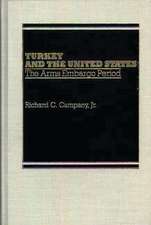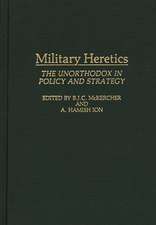Gorbachev's Military Policy in the Third World: The Financial Performance of America's Best-Run Companies: Washington Papers (Paperback), cartea 140
Autor Mark N. Katzen Limba Engleză Paperback – 6 iul 1989
Mark Katz's highly readable and useful overview of Soviet military interest in the Third World will be an important resource for anyone doing research in this field.
"Francis Fukuyama, Deputy Director for East-West Relations, Policy Planning Staff, U.S. Department of State"
In his timely and thoughtful assessment of Gorbachev's evolving military policy, Mark Katz cautions against concluding that Moscow has lost interest in retaining and acquiring positions of influence in areas such as Angola, the Arab world, Ethiopia, and Central America. By detailing for us the new thinking' in Moscow, and the new policies that it has spawned in the USSR's Third World Policy, he has made a valuable contribution to the ongoing debate about the challenge that Gorbachev poses to the United States. "Alvin Z. Rubinstein, Professor of Political Science, University of Pennsylvania"
This book examines the changes that have occurred in Soviet military policy toward the Third World under Gorbachev. Mark Katz studies Gorbachev's active pursuit of detente with the West in terms of his ambitious economic reform efforts. Katz maintains that since Gorbachev regards detente as so essential for the achievement of perestroika, he has adopted a less aggressive military policy in the Third World. This book examines the Soviet military statements since Gorbachev came to power, which indicate that the Soviet military, for the most part, does not oppose Gorbachev's retrenchment from the Third World. The Soviet military even seems to approve the decision to withdraw from Afghanistan.
The author points out that while Gorbachev has de-emphasized the expansion of Moscow's base network in the Third World, he has vigorously sought to reduce U.S. military access to it. Gorbachev has attempted to do this through a stepped-up diplomatic campaign to convince moderate Third World states that the Soviet Union is not their enemy and hence there is no need to ally with Washington against Moscow. Katz also analyzes the Soviet support of regional security proposals for Asia and the Pacific, the Persian Gulf, the Middle East, parts of Africa, Central America, and elsewhere. Katz maintains that if these security proposals are accepted, U.S. military access to them would definitely be reduced and that the Soviets' de-emphasis on obtaining new bases could mean that moderate Third World governments may become more amenable to accepting these regional security proposals.
| Toate formatele și edițiile | Preț | Express |
|---|---|---|
| Paperback (1) | 169.28 lei 6-8 săpt. | |
| Praeger Publishers – 6 iul 1989 | 169.28 lei 6-8 săpt. | |
| Hardback (1) | 352.04 lei 6-8 săpt. | |
| Praeger – 6 iul 1989 | 352.04 lei 6-8 săpt. |
Din seria Washington Papers (Paperback)
- 35%
 Preț: 123.03 lei
Preț: 123.03 lei - 32%
 Preț: 175.41 lei
Preț: 175.41 lei - 31%
 Preț: 175.70 lei
Preț: 175.70 lei - 34%
 Preț: 168.37 lei
Preț: 168.37 lei - 35%
 Preț: 268.96 lei
Preț: 268.96 lei - 23%
 Preț: 132.15 lei
Preț: 132.15 lei - 24%
 Preț: 175.59 lei
Preț: 175.59 lei - 31%
 Preț: 176.22 lei
Preț: 176.22 lei - 34%
 Preț: 127.62 lei
Preț: 127.62 lei - 31%
 Preț: 184.10 lei
Preț: 184.10 lei - 34%
 Preț: 170.16 lei
Preț: 170.16 lei - 28%
 Preț: 295.40 lei
Preț: 295.40 lei - 28%
 Preț: 298.18 lei
Preț: 298.18 lei - 34%
 Preț: 170.95 lei
Preț: 170.95 lei - 34%
 Preț: 169.88 lei
Preț: 169.88 lei - 34%
 Preț: 169.53 lei
Preț: 169.53 lei - 34%
 Preț: 168.82 lei
Preț: 168.82 lei
Preț: 169.28 lei
Preț vechi: 256.43 lei
-34% Nou
32.40€ • 33.98$ • 26.77£
Carte tipărită la comandă
Livrare economică 30 ianuarie-13 februarie 25
Specificații
ISBN-10: 0275933415
Pagini: 123
Dimensiuni: 152 x 229 x 8 mm
Greutate: 0.2 kg
Editura: Praeger Publishers
Colecția Praeger
Seria Washington Papers (Paperback)
Descriere
Francis Fukuyama, Deputy Director for East-West Relations, Policy Planning Staff, U.S. Department of State
In his timely and thoughtful assessment of GorbacheV&Apos;s evolving military policy, Mark Katz cautions against concluding that Moscow has lost interest in retaining and acquiring positions of influence in areas such as Angola, the Arab world, Ethiopia, and Central America. By detailing for us the `new thinking' in Moscow, and the new policies that it has spawned in the USSR's Third World Policy, he has made a valuable contribution to the ongoing debate about the challenge that Gorbachev poses to the United States. Alvin Z. Rubinstein, Professor of Political Science, University of Pennsylvania
This book examines the changes that have occurred in Soviet military policy toward the Third World under Gorbachev. Mark Katz studies GorbacheV&Apos;s active pursuit of detente with the West in terms of his ambitious economic reform efforts. Katz maintains that since Gorbachev regards detente as so essential for the achievement of perestroika, he has adopted a less aggressive military policy in the Third World. This book examines the Soviet military statements since Gorbachev came to power, which indicate that the Soviet military, for the most part, does not oppose GorbacheV&Apos;s retrenchment from the Third World. The Soviet military even seems to approve the decision to withdraw from Afghanistan.
The author points out that while Gorbachev has de-emphasized the expansion of Moscow's base network in the Third World, he has vigorously sought to reduce U.S. military access to it. Gorbachev has attempted to do this through a stepped-up diplomatic campaign to convince moderate Third World states that the Soviet Union is not their enemy and hence there is no need to ally with Washington against Moscow. Katz also analyzes the Soviet support of regional security proposals for Asia and the Pacific, the Persian Gulf, the Middle East, parts of Africa, Central America, and elsewhere. Katz maintains that if these security proposals are accepted, U.S. military access to them would definitely be reduced and that the Soviets' de-emphasis on obtaining new bases could mean that moderate Third World governments may become more amenable to accepting these regional security proposals.






















